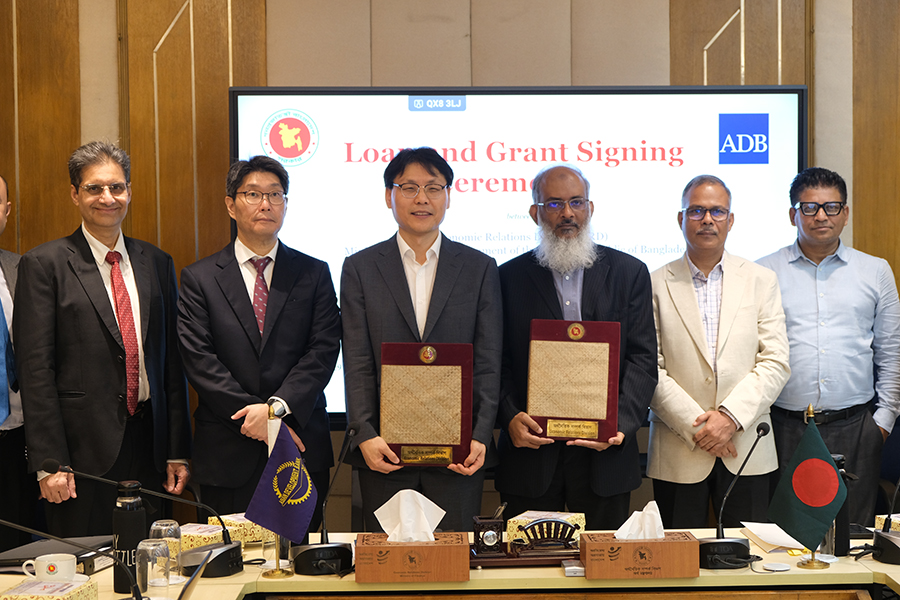
Published :
Updated :

The Asian Development Bank (ADB) and Bangladesh on Monday signed agreements worth $269.1 million in loans and $62.6 million in grants to support water supply, power distribution, and displaced people from Myanmar.
The signing ceremony was held at the Economic Relations Division (ERD) Conference Room in Dhaka.
Md Shahriar Kader Siddiky, Secretary of ERD, and Hoe Yun Jeong, ADB Country Director, signed the agreements on behalf of their respective sides. ADB Director General for South Asia, Takeo Konishi, attended the event as a witness.
$150m for water supply in Khulna
ADB and Bangladesh signed agreements for a $150 million loan and a $4.0 million grant to expand water supply services for unserved residents of Khulna city and to address groundwater salinity, ensuring a sustainable piped water supply during the dry season.
“This project advances Khulna city’s transition to surface water by introducing climate-resilient and sustainable solutions,” said ADB Country Director Hoe Yun Jeong. “It will provide 1.78 million people with a reliable, continuous supply of drinking water, upgrade existing infrastructure, and enhance the operations of the Khulna Water Supply and Sewerage Authority (KWASA).”
The Khulna Water Supply Project (Phase 2) will expand piped water services to underserved communities through a scalable system designed to meet demand through 2050. It will also introduce smart water supply management, expand supervisory control and data acquisition (SCADA) systems, and extend district metering areas to reduce non-revenue water.
In addition, a $4.0 million technical assistance grant from the Urban Resilience Trust Fund under the Urban Financing Partnership Facility will support studies on artificial recharge and groundwater management.
$91m to modernise power distribution in northwest Bangladesh
ADB and Bangladesh also signed a $91 million agreement to enhance the quality, efficiency, reliability, and resilience of the power distribution network in Rajshahi and Rangpur divisions.
“The project will benefit people in the region by driving sustainable, resilient, and digital transformation through advanced smart technologies,” said Jeong. “It will reinforce climate-resilient infrastructure, boost disaster preparedness, and create electricity-based livelihood opportunities for vulnerable communities—with special focus on women and marginalised people living on remote riverine islands.”
The Northwest Distribution Network Modernisation Project will establish a disaster recovery centre, expand the existing data centre, and upgrade transformer repair workshops. It will construct six new 33/11 kilovolt substations, build seven switching stations, and modernise 10 substations with gender-inclusive design features.
Rooftop solar with battery storage will be installed at critical control centres, while solar nano-grids will power flood shelters in riverine islands.
Grant financing of $2.0 million from ADB’s Japan Fund for a Prosperous and Resilient Asia and the Pacific (JFPR), funded by Japan, will strengthen resilience and support income generation in flood-prone communities.
$58.6m grant for displaced people from Myanmar and host communities
ADB and Bangladesh further signed agreements for a $58.6 million grant from the Asian Development Fund (ADF) and a $28.1 million concessional loan to improve basic infrastructure and services for displaced people from Myanmar (DPFM) and host communities in Bangladesh.
“We are pleased to support Bangladesh in strengthening resilience and livelihood opportunities for displaced people and host communities, while fostering social cohesion,” said Jeong. “This builds on our earlier $171.4 million in grants and loans since 2018 for both displaced persons and host populations.”
The Integrated Services and Livelihood for Displaced People from Myanmar and Host Communities Improvement Project will expand access to water, sanitation, hygiene, energy, food security, roads, bridges, and disaster resilience in Cox’s Bazar and Bhasan Char.
In the camps, the project will install solar-powered streetlights, rehabilitate faecal sludge systems, and optimise biogas production. For host communities, it will build cyclone shelters, introduce mini piped water systems, construct a surface water treatment plant with transmission pipelines, and improve roads to enhance connectivity.
Currently, more than 1.0 million displaced people from Myanmar—about 75 per cent of them women and children—live in 33 camps in Cox’s Bazar. Over 36,000 have been relocated to Bhasan Char in Noakhali.
sajibur@gmail.com


 For all latest news, follow The Financial Express Google News channel.
For all latest news, follow The Financial Express Google News channel.